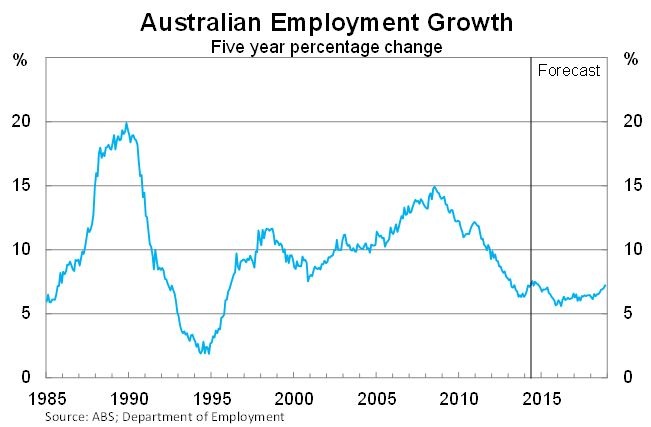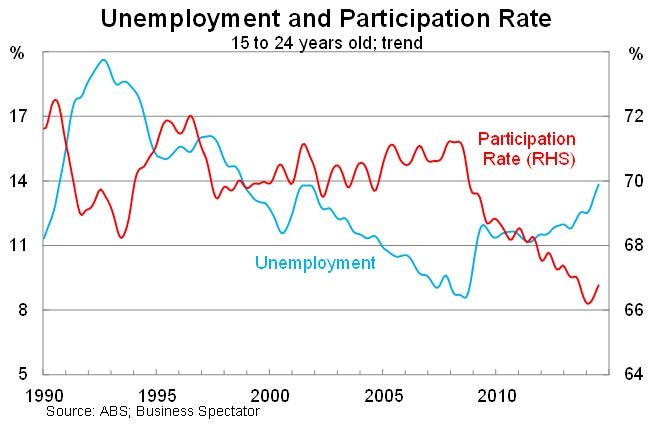Abbott must abandon his misguided war on the young and poor
The federal government faces a considerable, yet simple, problem: it isn’t Treasurer Joe Hockey’s loose lips, or Prime Minister Tony Abbott weighing in on Scottish independence. Its problem is much broader than that and affects every Australian -- young and old, wealthy and poor.
As former US President Bill Clinton famously said, “It’s the economy, stupid”. Sometime since September, the Coalition and its chief economic spokesman, Joe Hockey, lost all credibility on the economy. They now find themselves running scared from the same Aussie battlers former prime minister John Howard courted.
For all the talk about being sound economic managers, the Coalition has proposed a largely incoherent economic program. Despite playing hard-ball on the budget, it lost a lot of political capital for little gain. The main reforms in the 2014-15 budget -- if they pass a hostile Senate -- will do little to ease the structural problems facing the federal budget over the next few decades (Without real reform, Hockey’s budget pain will be for nothing, August 12).
The centrepiece of the government’s economic plan surrounds its G20 presidency. Abbott and Hockey have pushed for an ambitious growth target of an extra 2 per cent of real GDP, above current forecasts, over the next five years.
Although I’ve criticised the G20 growth target, it remains a laudable goal and one worth aspiring to. But there remains no action plan. In fact, the 2014-15 budget features no identifiable boost to employment growth over the next five years.
According to estimates from the Department of Employment, the Australian economy will produce around 830,000 new jobs over the five years to November 2018, or employment growth of 7.2 per cent.
That might sound impressive but it falls well short of the federal government’s promise to deliver one million new jobs over the next five years -- an aspiration which itself is fairly unambitious. Instead it reflects a continuation of the worst employment growth we’ve seen in two decades.

To put this into perspective, Australia’s population will rise by around 9 to 10 per cent over the next five years. As a result, Australia’s unemployment rate may trend higher (depending on participation) and our employment-to-population ratio will decline to its lowest level in over a decade.
In light of these numbers, does the federal government’s broader economic plan make any sense? Not even close.
For example, we continue to pursue a high level of immigration, despite skills shortages at historic lows -- crowding out employment for Australian or domestic residents (Abbott must rethink immigration, not slash welfare, August 8). The main losers have been younger Australians who are missing out on entry-level positions or graduate placements; the unemployment rate among those aged 15 to 24 has climbed to its highest level since 1998.

The federal government’s response to rising unemployment is to punish the unemployed for failing to find jobs that don’t exist. The better response would be to increase the number of available opportunities.
Welfare will be slashed and the unemployed will be required to dedicate 25 hours a week to Work for the Dole programs, which fail to enhance opportunities and actually make it more difficult to find a job (Why work for the dole doesn’t work, July 28).
More importantly, the federal government’s obsession with welfare recipients doesn’t stand up to close scrutiny. Australia has become less welfare-dependent over the past decade as a result of the strong economy -- just 3 per cent of households received a majority of their income via welfare over that period. Rather than punishing ‘dole bludgers’, the government is instead waging war against households that are suffering bad luck.
Unfortunately, the federal government is also pursuing policies which will sabotage the small number of jobs that will be created. According to the Department of Employment, around 230,000 new jobs will come from healthcare and social assistance -- a function of an ageing population. Almost 120,000 will be in education services.
So it makes little sense that the federal government has endorsed university deregulation that will raise the cost of the average degree and shift demand away from relatively low-paid professions -- such as nursing, teaching, social work and science. Instead we should expect more law and investment banking graduates (Tinkering with education will tear through Australia’s social fabric, June 26).
Australia is facing a number of challenges over the next few years -- beginning with the collapse in mining investment, the decline in our terms-of-trade and an ageing population -- and to navigate these challenges we need fiscal policy that enhances productivity and employment.
To meet their G20 goal -- which is worth pursuing -- the federal government will have to give up its misguided war on the young and poor. An ideological attack on welfare may galvanise its traditional supporter base but the rest of the electorate will judge them harshly for overseeing a prolonged period of poor employment and incoherent policy.
It simply isn’t enough for the federal government to say it supports growth; it’s time those words were into action by shifting direction towards policy that creates more opportunities for struggling Australians.
















